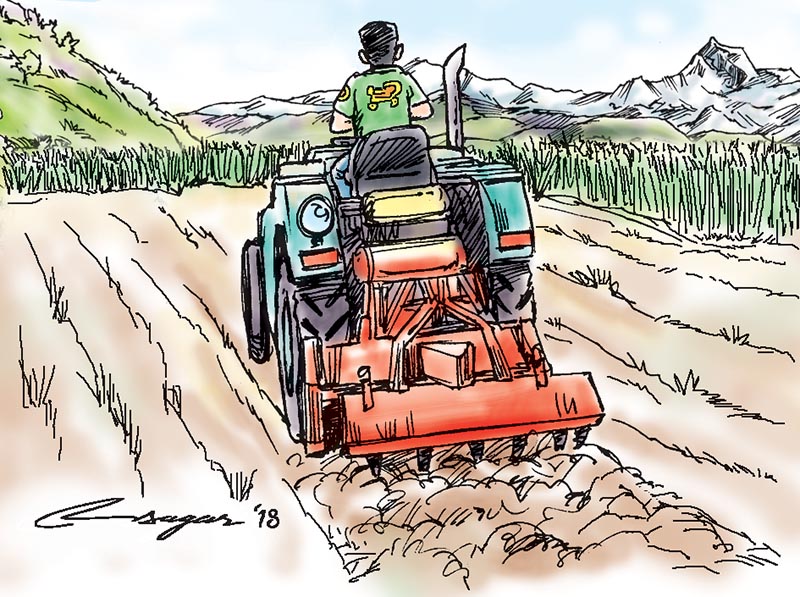Farming profession: There is need of attitudinal fix
In order to change the attitude of people towards making their career in farming, the agricultural institutes in the country and the human resources generated by them should advocate the possibilities and the opportunities in the agrarian sector
One can vividly recall those school days when teachers used to ask students what they wanted to become in future. It is a no-brainer that everybody wanted to become either a doctor or an engineer. Nobody would talk about becoming a farmer. Farming as a profession would never be in anyone’s wish list. This impression has transmitted from generation to generation.
But even in present time, students come up with similar answers. How can this drive our agrarian economy? This is a grave issue which may need immediate attention not only from policymakers but also from the people. Is this a problem at all or not may draw differing opinions. But how this mindset can deplete the dignity of farmers is a serious concern.
Besides the societal attitude, the impression that school and college students obtain from the very first class on industrialisation further adds the misery to already depleted image of the agrarian sector. The whole process of industrialisation is glorified and marked as an emphatic victory, whereas the agrarian sector is considered as residual sector. Students in class often overlook the fact that agriculture is the complementing sector for industrialisation. Certainly with such a gloomy picture of agriculture scenario in the country and with the message that has been transmitted through generations, one can’t imagine a child to have a wish of becoming a farmer.
In order to change the attitude of people towards making their career in farming, the agricultural institutes in the country and the human resources generated by them should advocate the possibilities and the opportunities in the agrarian sector.
However, majority of the graduates from premier agricultural institutes of the country go abroad for further studies. Few of them who are in the country are in bureaucratic services, which of course is a silver lining. But the moot question is how many of them actually practise farming as their profession? Does the curriculum cover the practical issue of farming? The present scenario suggests that the institutes have failed to engender positivity among people towards farming.
An attempt was made to understand the scenario derived from the above spectra at the ground level. After the preliminary observation in the Tarai, it was found that not a single child of family wished to become a farmer in future. Why has it become so wrong to wish to become a farmer?
The rising out migration from these areas clearly reflects their view. Further, the head of the farming household never wishes to return to agriculture if he gets any other job. For them, getting into farming is as good as falling into poverty trap. This was the case with most of the farmers, especially those who were involved in crop cultivation.
Agriculture accounts for more than 30 per cent of the country’s gross domestic product and is the means of livelihood for more than 60 per cent of the population.
Around 74.2 per cent of agricultural holdings are below one hectare. In fact, the Asian Pacific Commission on Agricultural Statistics 2010 says 91.7 per cent of the agricultural holdings are less than two hectares, accounting for 68.7 per cent of the total operated area.
And of late, the rapid urbanization in the country is taking place at the cost of farmlands, which also shows the lackadaisical approach taken by the concerned authorities to save the farmlands.
There is a need to protect farmlands and encourage people to get involved more in the agriculture sector. The lack of incentives for farmers also has been gradually causing people to lose their interest in farming.
Though everything seems to have depreciated the agrarian sector in Nepal, there have been instances of grit shown by people to uplift farming and bring change in the mindset of society.
There have been cases wherein youths have been actively engaged in poultry, fishery, livestock and vegetable farming. Youths in Kavre are engaged in vegetable farming.
On top of that, there have been youths in large numbers who have adopted farming as their profession after returning from gulf countries in hilly areas of Nepal. In contrast to that, there have been fewer
cases of youths involved in farming especially in the plain areas. So, it is very important to spread the positive vibe all over the country.
Hence policymakers at the higher level should consider the fact that investing in the farm sector is not only increasing the production of the sector but also uplifting the morale and dignity of farmers. Therefore, the concerned authorities need to step up efforts to plug the loopholes in this sector.
Winston Churchill once said that attitude is a little thing that makes a big difference. Time has come for people to take a bow and respect the farmers of the country and develop right attitude about them and pass it onto the next generations.
Hence, resolving the agrarian issue needs more than government’s investment—it needs the right attitude about farmers among policymakers as well as the people of this country.
Krishna Sharma is a consultant at the National Institute of Public Finance and Policy, New Delhi; and Praval Sharma is a freelance researcher in Nepal






